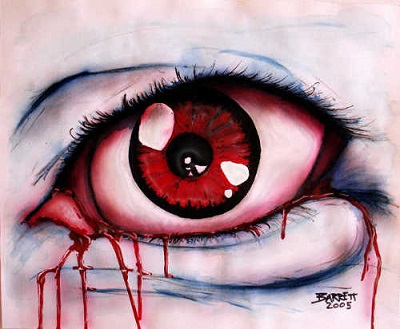FWP:
SETS == EXCLAMATION; HUMOR; MUSHAIRAH
On the nuances of the idiomatic expression balā se , see {58,1}.
This light and amusing little verse is a classic example of what I call a mushairah verse. It has all the relevant qualities in a clearly deployed form. The first line is exclamatory and even a bit shocking-- since when does the lover reject any demand of the beloved's? Her eyelashes are imperious, and their demand for blood is well-established in the ghazal universe. In fact, it can be said that the lover's blood really belongs to them, and that he only holds it in trust for them, as is made clear in {16,1} and {113,3}. So how does he have the nerve to deny them their right, with even a tone of indignation?
In mushairah performance style, we're of course made to wait as long as is conveniently possible before we're allowed to hear the second line. And even then, as the first part of the line unfolds before us we're still unable to 'get' it. Not until the last possible moment, when we hear the 'punch-word' ḳhūn-fishāñ , do we suddenly catch the meaning and the cleverness at the same instant: vāh vāh !
And then, the final quality of a mushairah-verse: when it's over, it's over. Once we've had that little burst of pleasure, we're entirely sure there's nothing more to come, no subtleties or further possibilities, and we can go on to the next verse.
The humor comes from the harassed lover's back-to-the-wall
attempt at fairness; he's like a parent being pestered by two clamorous five-year-olds,
and he's determined to give each set of eyelashes its due. But we also realize
with amusement that the seeming fairness masks the huge one-sidedness of the
fact that both batches of blood are destined for the beloved's delectation,
and it's really only a question of exactly when and how they'll be presented to her.

Nazm:
If her eyelashes are blood-drinking [ḳhūn-ḳhvār], then my eyelashes too are blood-scattering [ḳhūn-bār]. If I would give all the blood to her alone, then what would I keep for my own eyelashes? (265)
== Nazm page 265